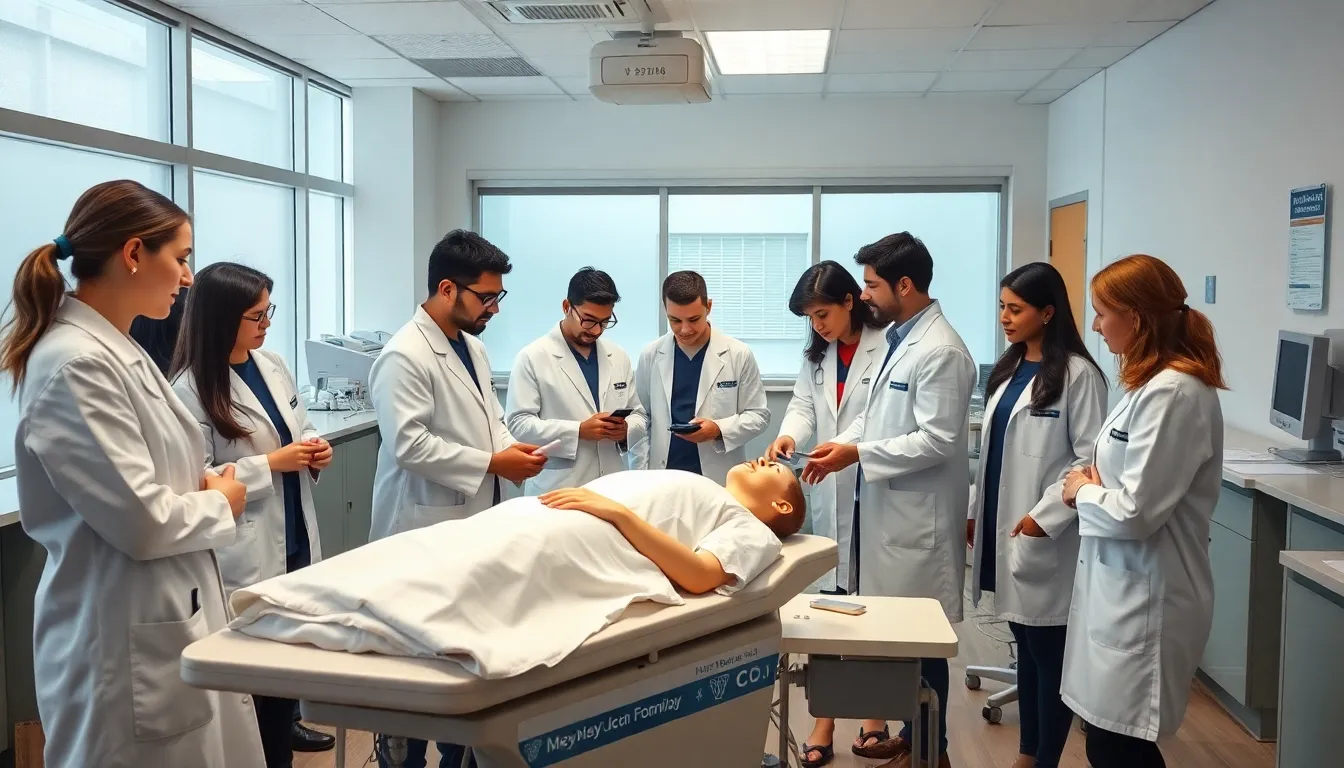Searching for anesthesiologist assistant schools nearby? You’re not alone! Many aspiring healthcare heroes are on the hunt for quality education that’ll get them into the operating room faster than you can say “snooze button.” With the right training, they can become the unsung champions of anesthesia, ensuring patients drift off to dreamland safely and soundly.
Table of Contents
ToggleOverview of Anesthesiologist Assistant Schools
Anesthesiologist assistant schools offer specialized programs designed for individuals pursuing careers in anesthesia. These programs typically include a master’s degree in anesthesiology. Courses commonly cover advanced physiology, pharmacology, and anesthesia techniques.
Admission requirements for anesthesiologist assistant programs often include a bachelor’s degree in a related field and relevant healthcare experience. Many schools also require prospective students to submit GRE scores and letters of recommendation.
Accredited programs ensure high-quality education. Accreditation from the Commission on Accreditation of Allied Health Education Programs, or CAAHEP, is critical for maintaining educational standards. Graduates from accredited schools often qualify for national certification, enhancing their employment opportunities.
Clinical training plays a significant role in anesthesiologist assistant programs. Students participate in hands-on clinical experiences, allowing them to apply theoretical knowledge in real-world settings. Schools commonly partner with hospitals and surgical centers to facilitate these experiences.
Job placement rates after graduation can reflect the effectiveness of these programs. Many graduates secure employment quickly, highlighting the growing demand for anesthesiologist assistants. Employers often seek candidates with strong clinical skills, communication abilities, and a commitment to patient safety.
Location of the school can also impact student choice. Prospective students frequently seek institutions close to home, balancing academic and personal responsibilities. Researching nearby schools can reveal various program reputations and outcomes.
Many anesthesiologist assistant schools provide online resources. These resources include virtual tours, program outlines, and admission guidelines. Utilizing these tools can help candidates make informed decisions about their education and career path.
Factors to Consider When Choosing Schools

Selecting an anesthesiologist assistant school involves careful consideration of several key factors.
Accreditation and Certification
Accreditation ensures that a school meets established standards in educational quality. Institutions accredited by the Commission on Accreditation of Allied Health Education Programs (CAAHEP) provide a degree that employers recognize. Graduates from accredited programs typically enjoy better job prospects. Certification also plays a significant role; passing the National Commission for Certification of Anesthesiologist Assistants (NCCAA) exam is often necessary for employment. Choosing an accredited program increases the likelihood of successfully obtaining certification.
Program Curriculum
A robust curriculum forms the backbone of anesthesiologist assistant training. Programs generally cover essential topics such as pharmacology, physiology, and anesthesia techniques. Courses often include both theoretical knowledge and practical applications. Some schools offer specialized electives that allow students to focus on specific areas of interest. Reviewing a program’s curriculum helps prospective students ensure it aligns with their career goals.
Clinical Training Opportunities
Clinical training opportunities are vital for hands-on experience. Many schools partner with hospitals and surgical centers to provide these experiences. Participation in clinical rotations allows students to work alongside experienced anesthesiologists. High-quality programs typically offer extensive clinical placements, enhancing skills in real-world settings. Evaluating the clinical training component reveals how well a program prepares students for their future careers.
Top Anesthesiologist Assistant Schools Near Me
Several institutions offer robust programs for aspiring anesthesiologist assistants. These schools combine rigorous academic training with essential clinical experience.
School A: Overview and Highlights
School A features a master’s degree program accredited by the Commission on Accreditation of Allied Health Education Programs (CAAHEP). Its curriculum includes core subjects such as pharmacology, anesthesia techniques, and physiology. Students benefit from clinical placements in local hospitals, fostering hands-on experience. Graduates consistently achieve high job placement rates due to strong industry connections. The program also offers specialized electives tailored to emerging trends in anesthesia.
School B: Overview and Highlights
School B offers a comprehensive master’s program designed to prepare students for success in the field. The accreditation by CAAHEP validates the program’s quality and rigor. Coursework covers advanced topics in anesthesiology, enhancing students’ understanding of patient care. Clinical training occurs in various settings, giving students diverse exposure to real-world scenarios. Networking opportunities with experienced anesthesiologists further enhance career prospects for graduates.
Admission Requirements and Application Process
Admission to anesthesiologist assistant schools involves several key requirements. A bachelor’s degree in a related field serves as the foundational education requirement. Relevant healthcare experience also plays a critical role, as schools prefer candidates with exposure to medical environments.
GRE scores are often required, reflecting the candidate’s ability to succeed in graduate-level studies. Letters of recommendation from professionals familiar with the applicant’s capabilities can strengthen their application.
Completing an application typically requires candidates to submit transcripts and test scores, along with a statement of purpose. Many schools will outline specific application deadlines, emphasizing the importance of timely submission for consideration.
Accreditation, particularly from the Commission on Accreditation of Allied Health Education Programs (CAAHEP), holds significant weight. Graduates from accredited programs often enjoy enhanced employment opportunities due to recognized educational standards.
After initial review, selected applicants may undergo interviews to assess their suitability for the program. Schools often use this process to gauge interpersonal skills and commitment to the profession.
Clinical training stands as a vital component of the educational journey. Programs integrate hands-on experiences through partnerships with hospitals and surgical centers. Students engage in real-world practices, ensuring they are well-prepared to enter the field immediately upon graduation.
Accepting an offer may require candidates to confirm their enrollment by a specified date. Accepted students will receive additional information regarding orientation and program specifics to help them transition smoothly into their studies.
Finding the right anesthesiologist assistant school is a crucial step for those looking to enter this rewarding field. With a focus on quality education and hands-on clinical training, aspiring anesthesiologist assistants can position themselves for success. The importance of accreditation and a robust curriculum cannot be overstated, as these factors significantly influence job prospects post-graduation.
By considering local options and utilizing available resources, candidates can make informed decisions about their educational paths. Ultimately, the right school can pave the way for a fulfilling career dedicated to patient safety and effective anesthesia management.



